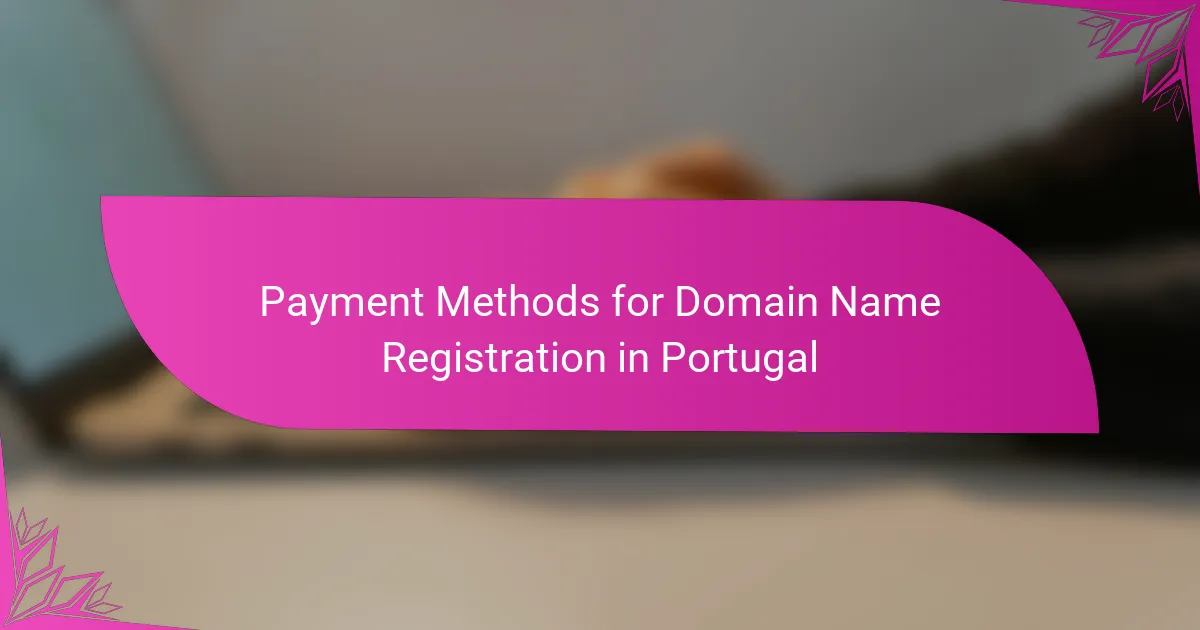In Portugal, a variety of payment methods are available for domain name registration, including credit and debit cards, PayPal, bank transfers, cryptocurrency, and services like Stripe. When selecting a payment option, it’s important to consider factors such as transaction fees, security, and convenience to find the best fit for your needs. Each method has its own advantages, making it essential to evaluate them carefully before proceeding with your domain registration.
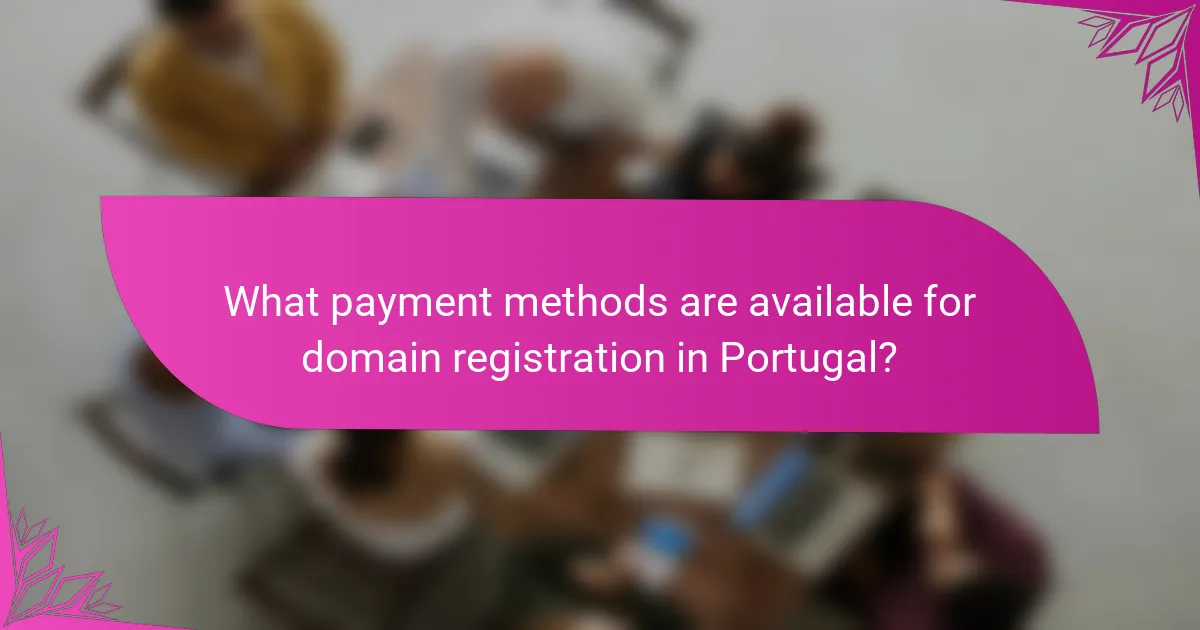
What payment methods are available for domain registration in Portugal?
In Portugal, several payment methods are available for domain name registration, catering to different preferences and needs. The most common options include credit and debit cards, PayPal, bank transfers, cryptocurrency, and payment services like Stripe.
Credit and debit cards
Using credit and debit cards is one of the most straightforward methods for domain registration in Portugal. Most registrars accept major cards such as Visa, MasterCard, and American Express, allowing for instant payment processing.
When paying with a card, ensure that the registrar has secure payment gateways to protect your financial information. Additionally, check for any potential foreign transaction fees if your card is issued outside of Portugal.
PayPal
PayPal is a popular choice for domain registration due to its ease of use and buyer protection features. Many registrars in Portugal support PayPal, allowing users to link their accounts for quick payments.
Keep in mind that while PayPal transactions are generally secure, you should verify the registrar’s reputation and ensure they are authorized to accept PayPal payments. This can help avoid potential issues with your domain registration.
Bank transfers
Bank transfers are another viable option for domain registration in Portugal, especially for larger transactions. This method typically involves transferring funds directly from your bank account to the registrar’s account.
While bank transfers can take a few days to process, they are often favored for their security. Be sure to include your order number in the transfer details to ensure proper allocation of your payment.
Cryptocurrency
Some domain registrars in Portugal are beginning to accept cryptocurrency as a payment method. This option appeals to tech-savvy users who prefer decentralized currency transactions.
When using cryptocurrency, check the registrar’s policy on accepted currencies and conversion rates. Additionally, be aware of the volatility in cryptocurrency values, which can affect the final cost of your domain registration.
Payment services like Stripe
Payment services such as Stripe offer a modern and efficient way to handle online transactions for domain registration. Many registrars utilize Stripe to facilitate secure payments without requiring users to leave their websites.
Using Stripe can streamline the payment process, making it quicker and more user-friendly. Always ensure that the registrar is reputable and that their Stripe integration is secure to protect your payment information.

How to choose the best payment method for domain registration?
Choosing the best payment method for domain registration involves considering transaction fees, security, and convenience. Each payment option has its pros and cons, so it’s essential to evaluate them based on your specific needs and preferences.
Consider transaction fees
Transaction fees can vary significantly depending on the payment method you choose. Credit cards may have higher fees compared to bank transfers or e-wallets, which often offer lower costs. Look for payment options that minimize these fees to keep your overall registration costs down.
Some registrars may also offer discounts for specific payment methods. For example, using a bank transfer might save you a few euros compared to credit card payments. Always check the registrar’s fee structure before making a decision.
Evaluate payment security
Security is crucial when selecting a payment method for domain registration. Look for options that offer strong encryption and fraud protection. Credit cards typically provide robust security features, while e-wallets often have additional layers of protection.
Ensure that the registrar uses secure payment gateways and complies with relevant regulations, such as PCI DSS for credit card transactions. This will help safeguard your financial information during the registration process.
Assess convenience and speed
Convenience and speed are important factors in choosing a payment method. Credit card payments are usually processed instantly, allowing for immediate domain activation. In contrast, bank transfers may take several days to clear, delaying your registration.
Consider your urgency when registering a domain. If you need the domain quickly, opt for a payment method that guarantees fast processing. Additionally, choose a method that you find easy to use, whether it’s a credit card, e-wallet, or another option.
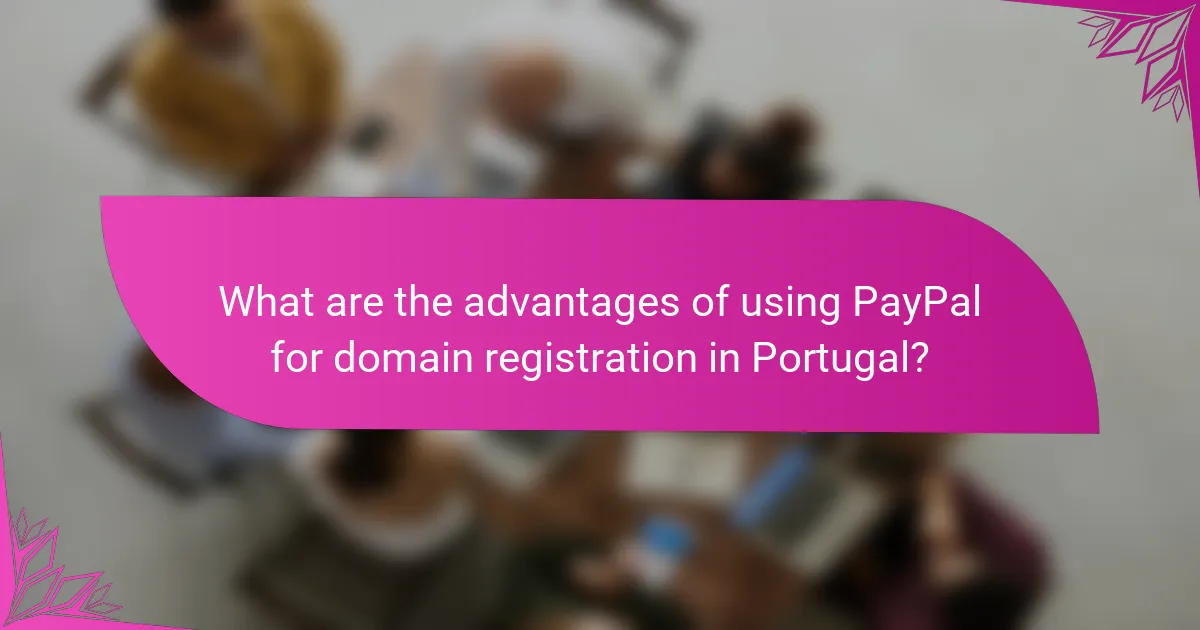
What are the advantages of using PayPal for domain registration in Portugal?
Using PayPal for domain registration in Portugal offers several advantages, including enhanced security and convenience. PayPal’s established reputation and features make it a preferred choice for many users looking to register domain names.
Buyer protection features
PayPal provides robust buyer protection features that can safeguard your transactions when registering a domain. If a dispute arises, such as not receiving the domain or it being misrepresented, PayPal allows users to file a claim and potentially recover their funds.
This protection is particularly valuable in the domain registration market, where issues can occasionally occur. Users can feel more secure knowing that they have recourse in case of problems with their purchase.
Instant payment processing
PayPal enables instant payment processing, which is crucial for domain registration. Once you complete the payment, the transaction is typically confirmed within minutes, allowing you to secure your domain name without unnecessary delays.
This speed is especially beneficial in a competitive market, where domain names can be claimed quickly. By using PayPal, you can ensure that your desired domain is registered promptly, reducing the risk of losing it to another buyer.
Wide acceptance among registrars
Many domain registrars in Portugal accept PayPal as a payment method, making it a convenient option for users. This wide acceptance means you can choose from various registrars while still using your preferred payment method.
When selecting a registrar, check their payment options to confirm they accept PayPal. This flexibility allows you to compare prices and services without being limited by payment methods, ensuring you find the best deal for your domain registration needs.
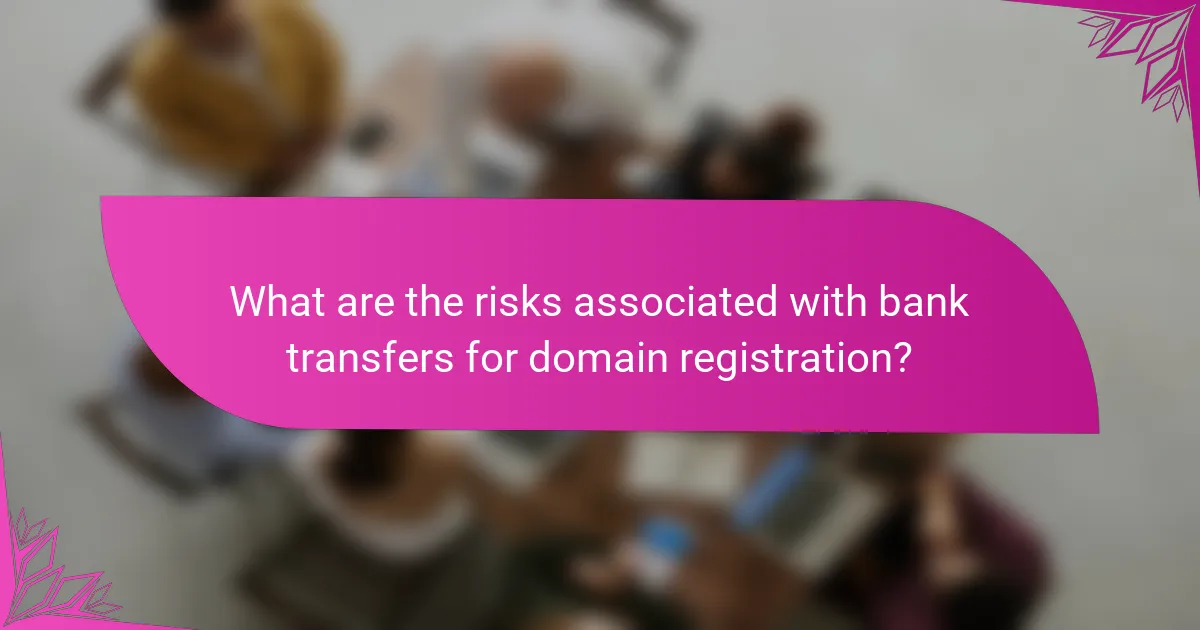
What are the risks associated with bank transfers for domain registration?
Bank transfers for domain registration carry several risks, including irreversibility, potential for fraud, and delayed processing times. Understanding these risks can help you make informed decisions when choosing payment methods for your domain purchases in Portugal.
Irreversible transactions
Bank transfers are typically irreversible, meaning once the money is sent, it cannot be reclaimed without the recipient’s consent. This poses a significant risk if you accidentally send funds to the wrong account or if the domain registrar fails to deliver the service after payment.
To mitigate this risk, double-check the recipient’s details before completing the transfer. Consider using a payment method that offers buyer protection, especially for larger transactions.
Potential for fraud
Fraud is a concern with bank transfers, particularly if you are dealing with unfamiliar registrars. Scammers may pose as legitimate domain providers, tricking you into sending money without delivering the domain.
To protect yourself, research the registrar thoroughly and look for reviews or testimonials. Use secure payment methods and avoid transferring money to unknown entities.
Delayed processing times
Bank transfers can take several days to process, which may delay your domain registration. This lag can be problematic if you are trying to secure a domain that is in high demand or if you have a tight deadline.
To avoid delays, consider using faster payment options like credit cards or online payment services that offer instant transactions. Always check the expected processing times when choosing your payment method.
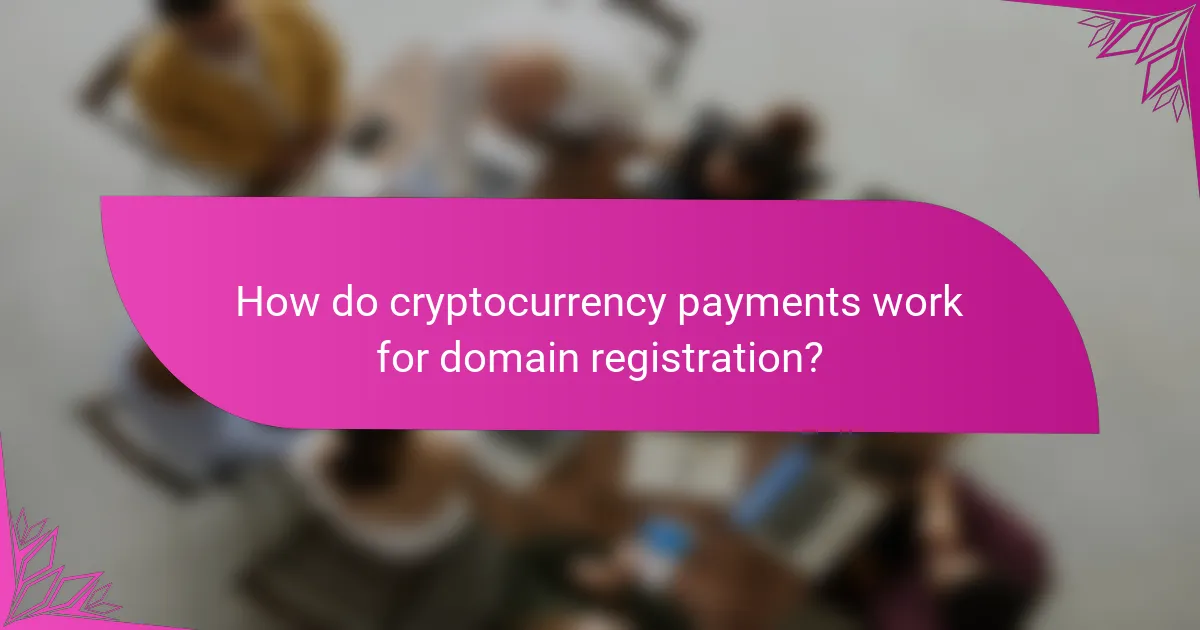
How do cryptocurrency payments work for domain registration?
Cryptocurrency payments for domain registration involve using digital currencies like Bitcoin or Ethereum to complete the transaction. This method offers a decentralized approach, allowing users to bypass traditional banking systems and potentially enjoy lower fees.
Decentralized transactions
Decentralized transactions mean that payments are processed directly between the buyer and the registrar without intermediaries. This can lead to faster processing times, often completed within minutes, compared to traditional payment methods that may take longer due to bank processing times.
Additionally, decentralized transactions enhance privacy, as they do not require personal information to be shared with banks or payment processors. However, users should ensure that the registrar accepts cryptocurrency to utilize this benefit.
Volatility of cryptocurrency value
The value of cryptocurrencies can fluctuate significantly, sometimes within short periods. This volatility can impact the final cost of domain registration if the payment is not made quickly, potentially leading to higher expenses than initially anticipated.
To mitigate this risk, users should consider converting their cryptocurrency to a stablecoin or fiat currency before making the payment. This approach can help lock in a specific value and avoid surprises during the registration process.
Limited registrar acceptance
Not all domain registrars accept cryptocurrency as a payment method, which can limit options for users. It’s essential to research and choose a registrar that explicitly supports cryptocurrency payments to avoid complications during the registration process.
Additionally, registrars that do accept cryptocurrency may have specific guidelines or preferred currencies. Users should review these details carefully to ensure a smooth transaction and avoid issues related to payment acceptance.
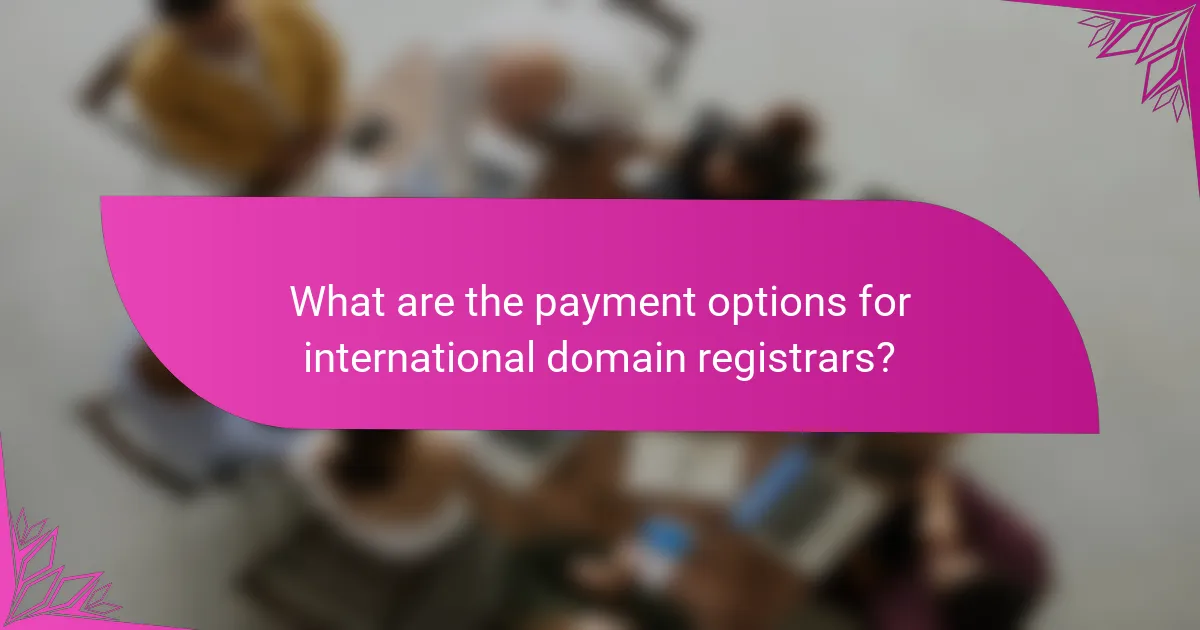
What are the payment options for international domain registrars?
International domain registrars typically offer several payment options to facilitate domain name registration. Common methods include credit card payments, bank transfers, and digital wallets, each with its own advantages and considerations.
Credit card payments
Credit card payments are one of the most popular methods for registering domain names due to their convenience and speed. Most registrars accept major credit cards like Visa, MasterCard, and American Express, allowing for immediate processing of transactions.
When using a credit card, ensure that the registrar has secure payment processing to protect your financial information. Additionally, check for any foreign transaction fees that your bank may impose if the registrar is based outside Portugal.
To avoid issues, keep track of your credit card expiration dates and ensure that your billing information is up to date. This will help prevent interruptions in your domain registration or renewal process.
